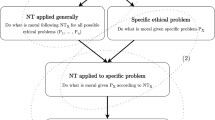Abstract
In this paper I argue for modesty concerning what theoretical reason can accomplish in the moral dilemmas debate. Specifically, I contend that philosophers' conclusions for or against moral dilemmas are driven less by rational argument and more by how the moral world intuitively appears to them.
I support this thesis by first considering an argument against moral dilemmas, the argument from deontic logic, and showing that its persuasive force depends on one's having already accepted its conclusion. I then make a different, and general, case that any argument in the moral dilemmas debate concerning the defeasibility of conflicting obligations can be marginalized by making not-unreasonable adjustments in the conditions for wrongdoing.
These two strands of argument are related by the notion of inescapable wrongdoing. It is our standing intuitions about inescapable wrongdoing which make the relevant deontic logical principles plausible or implausible to us. And whether wrongdoing can be inescapable is central to deciding what the conditions for wrongdoing are. My conclusion is that the arguments in the moral dilemmas debate merely implement whatever standing intuition we have concerning inescapable wrongdoing, and that apart from any such intuition the arguments are unpersuasive.
Similar content being viewed by others
Author information
Authors and Affiliations
Rights and permissions
About this article
Cite this article
Weber, T.B. The Moral Dilemmas Debate, Deontic Logic, and the Impotence of Argument. Argumentation 16, 459–472 (2002). https://doi.org/10.1023/A:1021182606590
Issue Date:
DOI: https://doi.org/10.1023/A:1021182606590



